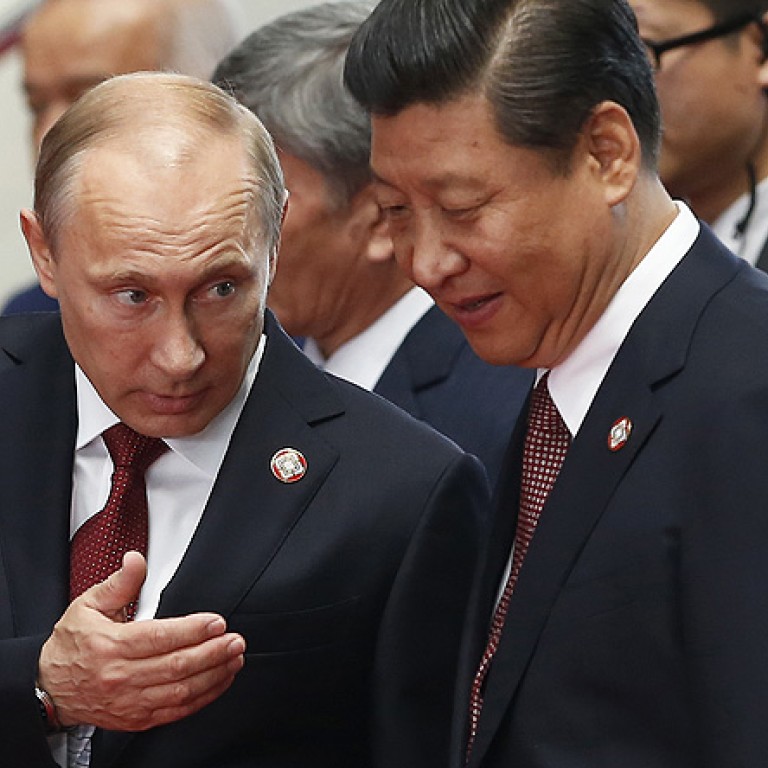
China and Russia are right to seek cooperation in win-win energy deals
Hu Shuli says the neighbours must continue to favour trade benefits over any political and military alliance, given the historical mistrust
Amid the rapidly changing fortunes in geopolitics, the Sino-Russian relationship is one that bears watching, especially with Russian President Vladimir Putin in China on a state visit this week.
The day he arrived, the two countries held a joint military exercise in the East China Sea. No doubt this provided more fodder for analysis and speculation, but there's really no mystery to the bilateral relationship. Sino-Russian relations must be based on a spirit of win-win cooperation, as must all China's other major relationships.
On Tuesday, Putin met President Xi Jinping for a wide-ranging discussion on bilateral cooperation, not least in trade and politics. Indeed, with pragmatism the guiding principle, trade remains the best way to further the partnership. The just-concluded US$400 billion gas deal, in particular, will greatly benefit both.
Relations between the strategic partners have in fact been on the upswing. Russia wants to see bilateral trade top US$100 billion in two years, and US$200 billion by 2020. It also hopes to diversify the economic relationship.
These targets are commendable. But even if they are reached, the Sino-Russian economic relationship will still be dwarfed by China's trade with advanced economies. Sino-US trade, for example, amounted to almost US$500 billion in 2012; even with Japan, with whom China has been feuding, trade came close to US$330 billion.
Energy cooperation will be the best booster for Sino-Russian trade. Here, the two neighbours are natural partners. Russia has substantial oil reserves and the world's largest reserves of natural gas. Meanwhile, China's appetite for oil continues to grow. It currently imports about 60 per cent of the oil it uses. But with environmental problems worsening, its reliance on natural gas is sure to grow.
Yet, despite the clear advantages of cooperation, progress on a gas deal was torturously slow. Last year, China imported 24.35 million tonnes of oil from Russia. This makes Russia the fourth-ranked source country for China, behind the geographically more distant Angola, for instance.
True, the two neighbours last year agreed on a contract that will see Russia supplying China with 40 million tonnes of oil a year over 25 years. But any celebration should wait. After all, it was not too long ago that the two inked a similar deal that would have seen Yukos supplying China with some 30 million tonnes of oil a year till 2030, and which has since unravelled. Such U-turns are common in Sino-Russian energy deals.
The reasons for this are complex, the historical baggage of mistrust being one of them. In Russia, the disparate groups of West-leaning liberals, radical nationalists and suspicious bureaucrats in the Far East all oppose building closer relations with China.
Geopolitical considerations add to the complications, with fears of being overly reliant on Chinese oil dollars becoming a worry in Russian government quarters. The East Siberia Pacific Ocean pipeline, or Espo, is one example. Its original conception as a pipeline that would deliver oil from Russia's Angarsk oil field to Daqing in northern China never came to pass.
Then in 2009, the completion of part of the Central Asia-China gas pipeline, a joint venture between China, Kazakhstan, Uzbekistan and Turkmenistan, also alarmed Russia, which has traditionally regarded Central Asia as its own backyard.
The recent Ukraine crisis has forced Russia to reconsider its relations with the West. By so doing, it may have well have spurred progress on the Sino-Russian gas deal . Price was the sticking point: Russia expected a price set by market conditions, which was at odds with the Chinese practice of domestic price controls. Evidently, both sides saw the need for compromise.
In the larger context of Sino-Russian cooperation, however, public opinion in China needs to better understand the limits of this relationship.
Currently, some analysts advocate seeking Russian support in China's territorial disputes with its neighbours. This is unrealistic.
It should be remembered that at a time when Sino-Japanese friction was escalating, Russia visibly strengthened its trade and security relations with Japan. Not only did Japanese Prime Minister Shinzo Abe visit Russia in April last year, but the foreign and defence ministers of the two countries also met last November in a summit.
In Southeast Asia, Russia has traditionally had close ties with Vietnam, and both are currently in talks to deepen energy and military cooperation.
On the international stage, national interests always come first.
Beijing has repeatedly said that relations with Moscow need not focus on politics and military affairs. Since the unrest in Ukraine, there's been excited talk of a return of the cold war. Such hyperbole is unhelpful. Instead, practical cooperation should guide international relations. It will help strengthen Sino-Russian relations.

